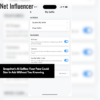Platform
Snapchat’s ‘Sponsored Snaps’ Arrive: Ads In Your Chat Tab, Explained
Snapchat will introduce “Sponsored Snaps” in its main Chat tab, marking the first time the platform will display advertisements in its most frequently used section.

In a memo to employees, Snap CEO Evan Spiegel outlined that these sponsored messages will appear unread above users’ regular conversations.
Spiegel revealed that these ads will arrive without push notifications, and users can choose to open them.
In addition to Sponsored Snaps, Snapchat plans to introduce paid promotions for advertisers in its Map tab, where users can view their friends’ locations.
These changes coincide with Snapchat’s 13th anniversary on September 16.
Financial Struggles
The introduction of Sponsored Snaps comes as Snap faces financial pressures.
Despite boasting over 850 million monthly users globally, Snap lags behind competitors like Meta in advertising and has yet to achieve profitability. Snap’s stock price has been hovering near an all-time low.
Spiegel addressed investor concerns about growth rates in the digital advertising business, highlighting the company’s long-term revenue potential.
“Sponsored Snaps empower advertisers to communicate visually with the Snapchat community, making Snapchat’s core functionality accessible to advertisers,” Spiegel wrote.
In May, Spiegel admitted that Snap had “fallen behind the curve on the machine learning side, which, to some degree, was reflected in the business performance.”
The financial setbacks may explain Snapchat’s recent launch of native iPad support 13 years after its initial iOS debut in 2011. The company didn’t disclose the reasons for the release’s timing.
Privacy Concerns
To assuage potential privacy concerns, Spiegel assured users that their conversations with friends remain private and are not used for advertising. However, details about how users can dismiss Sponsored Snaps without opening them weren’t clarified.
In June, Snap introduced four safety features to protect users, particularly teens, from online threats. These features built on existing safeguards and addressed emerging concerns such as sextortion scams.
The U.S. Department of Justice (DOJ) recently filed a lawsuit against TikTok, alleging that the platform’s practices amounted to a “massive-scale” invasion of child privacy, violating laws requiring parental consent for data collection from users under 13.





















